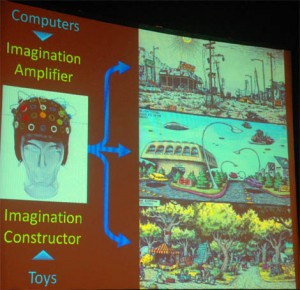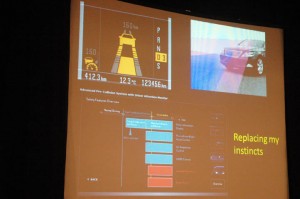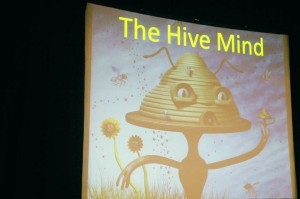“The game is about the world not dragons,” Will Wright, Founder and Chief Executive Stupid Fun Club, Creator of Spore and The Sims.
I had a brief chat with Will Wright after his talk at Engage!, and I was delighted to hear that augmented reality is high on his agenda at the moment:
“a lot of our stuff is kind of in the experimental format right now, but definitely one of our strong interests is AR.”
Will Wright will be coming to speak at Augmented Reality Event, Santa Clara, CA., June 2nd, 3rd, 2010. But, for now, here are a few hints at some of the directions that are intriguing him, e.g., the game potential of 3D mapping like Blaise Aguera y Arcas’s demo of augmented reality maps at TED - see the full conversation below.
There has been a vital shift, Will Wright points out. Before the Wii, immersive was understood as how much we were pulled into the world of the game. Now immersive is how much the game pulls us deeper into our world, e.g., our relationship with the people we are playing with as in Rock Band, or engaging with other people’s crazy antics when playing Wii games.
“Computers are imagination amplifiers and toys are imagination constructors.”
The slide above is from Will Wright’s talk at Engage!
Will Wright’s talk was extraordinary, dense, layered, and deeply thought provoking.
I have picked out a few samples from Will Wright’s vast tome of slides here. They are just a glimpse of the many insights he offered. If you are still wondering what will transform augmented reality into a mainstream experience, I suggest studying this talk carefully (I think the audio will be posted on the Engage! web site). Also watch Will Wright’s, Games For Learning Institute talk at NYU, February 17th, 2010, archived here.
Will Wright and Stupid Fun Club are getting ready to takes us to the next level of imagination amplification and construction.
“Smart” things can make us dumber by overriding our instincts
Just one of the many wonderful anecdotes Will Wright told was the story of his experiences with a new “smart” car (he bought this car with the intent of exploring the pinnacle of the “smart” car experience). The slide above is from Will Wright’s talk at Engage!
Increasingly, artifacts are being designed to send us more and more data, and this car was endowed with an array of sensors supplying data aimed at assisting parallel parking – a notoriously challenging aspect of driving. But the car failed miserably in helping.  While parallel parking had been easy for him prior to being deluged with all this data, Will Wright pointed out, ironically, he had to learn to ignore this stuff to park the “smart” car.
Instinctively, we learn to filter the information necessary for parking to the relevant stuff. This kind of pre-conscious filtering is a key challenge for augmented reality, and one that Will Wright, as a game designer, has given great deal of thought to.
As Will Wright pointed out, a lot of our ideas about augmented reality, and sensor enabled artifacts, are rooted in trying to give us more data, to “take over our instincts.”  Not only do these artifacts attempt to give us more data, which as in the case of the HUDs for parallel parking can get in the way of our own highly effective intuitive instincts. But, as Will Wright also noted, these artifacts also have more data which they can deploy independently to override our instincts, e.g., the car detecting your head has turned back to talk to a passenger and applying the brakes!
“Toys Encourage Agency”
Toys can be the antidote to instinct blocking “smart things.” In contrast to “smart” data spitting cars that “take over” our instincts, toys encourage agency. Will Wright gave the example of high dynamic lighting photographs that make the world “toy like” and encourage us want to reach in and play with it (photo above from HDRCreme).
“What Computers are really good at is harvesting human intelligence”
Another key insight that Will Wright explored in depth in his talk was the significance of crowd sourced intelligence (the slide above is from Will Wright’s talk at Engage!). If the crowd is training the filter, he suggested to me, this might build the kind of context we need to build meaningful augmented reality experiences (for more on this see the conversation below).
Talking with Will Wright at Engage!, NYC, 2010
Tish Shute: I was very interested by the idea you put out that this deluge of information gathered by sensors is not necessarily a kind of nirvana for augmented reality, in fact it can be just the opposite. In the embryonic world of augmented reality, we have two streams it seems at the moment – one is the idea of a kind of like hyper local nirvana imagined for AR, in which we get information relevant to us, when and where we need it.  But you talked about some of the problems in realizing this, didn’t you? The other strand is the emerging stream of play which you are exploring..
Will Wright: Right. I think part of it is like what I was talking about-the way our senses are set up to know how to filter out 99% of what is coming into them. That is why they work, and that is what is beneficial. I think that is why AR needs to focus on…
You look at what I can find out on Google or whatever, the amount of information is just astronomical. The hard part, the intelligent part, is how do you figure out that one tenth of 1% that I actually care about at this given second?
Tish Shute: Yes. Have you seen any examples of AR beginning to do that?
Will Wright: No, not at all. I think that you have to have a contextual understanding of where I am at, where my mindset is, what my situation is, what my goal state is in a moment by moment basis. And then it is still a complex task. But the very first thing we need is more context for building a filter. See, that filter is changing every few minutes, you know, what I am filtering into my senses is changing, and my context is changing moment to moment.
Tish Shute: I really liked your emphasis on crowd sourced intelligence as the key power of a networked world, is this the seed..?
Will Wright: Well, you can imagine crowd sourcing that filter…it would affect a million people and get a sense of what mental context that they were in and what filter they turned on. And so, in a sense, the crowd is training the filter.
Tish Shute: Yes. The problem with projects like SIRI, that is driven by the big DARPA AI project, CALO, is it is centralized – although I am not sure what they intend to do in terms of crowd source corrections? But if it was all open and we could crowd source as well that would be interesting. But in the end we need a framework for AR that is as open as the internet, don’t we?
Will Wright: Right. I think the technological infrastructure needs to be much lighter so that it can be grounded in more like a Twitter feed or something.
Tish Shute: Yeah. I’m actually working on a project using the Wave Federation protocol as the basis for an open communications framework for augmented reality, AR Wave – not the Wave user interface, just the real-time federation protocol. But, of course, for it to become an open framework that could be a vehicle for crowd trained augmented reality it would need good take-up!
Will Wright: Right. You really want a million people involved.
Tish Shute: Yes our dream is that the creation of augmented reality content will be as open, accessible and simple as making an html page, or contributing to a wiki.
So in terms of AR games what is interesting on the horizon, presumably games also have to solve the problems of delivering a hyper local experience. The car that you described in your talk tried hard to use augmented reality to solve the problem of parallel parking and ended up making it harder. So giving us the information we need, where we need it, when we need it, and specific to who we are is going to be a big challenge. But I mean in terms of games, what kinds of hyper local experiences will be most fun and what have you seen that is interesting in terms of augmented reality games up to now?
Will Wright: I’ve not actually seen much at all. I’ve seen people doing interesting stuff with like Google Maps. They aren’t really entertainment oriented, but I think you can start thinking about…
I mean I think for a lot of people, Google Street View is entertainment. But I haven’t really seen something that was really leaning into an entertainment application using existing technology and data that is already out there.
I mean I have seen some cool experiments-people playing Pac-Man in Washington Square and stuff like that, but nothing really serious.
Tish Shute: Yeah. of course I think one of the missing links is that the barrier of entry is way to high for creating social augmented experiences for smart phones, and as you point out in your talk it is the social implications of the game is what makes it compelling.
Will Wright: Also, I think using them [smart phones] as data aggregation devices rather than just data consumption devices…so that people out there are using their phone, cameras, microphones, or whatever to gather data and get an experience where they are rewarded for gathering data.
Tish Shute: Like foursquare where you get the badges, and people can become the mayor of like a cafe or something.
Will Wright: Right. Yeah, you can imagine people using their phones to actually kind of pull information…
Tish Shute: A Dutch developer/artist/game designer, Thomas Wrobel, Lost Again, came up with the original concept for the AR framework we are building on the Wave Federation protocol. Thomas and his partner Bertine van Hovell design alternate reality games, amongst other things they do…so they are deeply immersed in the potential of the world as game.
Will Wright: Yeah, one of my programmers actually works in Amsterdam….there is a whole sub-community…
Well, yeah. The possibilities are tremendous. And Wii is actually training us that way [to be as much engaged with the other players in the physical space as the virtual game], so it is going to happen.
Tish Shute: What are the most exciting things you see at the moment, and for the next 12 months for augmented reality?
Will Wright: Gosh. I mean I just think there is cool stuff happening in mapping, in general.
Tish Shute: Like Blaise Aguera y Arcas’s demo of augmented reality maps at TED?
Will Wright: Yeah, I thought the 3-D mapping with Microsoft…I think like the next level of that is going to be really compelling.
Tish Shute: You see game potentials in that?
Will Wright: Yeah. You start overlaying really cool game potential on top of that.
Tish Shute: Might you get interested and do something?
Will Wright: Oh, yeah. I mean in terms of games, that is one of my biggest interests, is AR.
Tish Shute: Are you allowed to talk about anything specific at all?
Will Wright: Not yet, no. I mean a lot of our stuff is kind of in the experimental format right now, but definitely one of our strong interests is AR.
Tish Shute: Yeah, absolutely. We are over being tied to our desks to use computers -we want to be doing it anywhere, anytime, with anything…
Will Wright: Now the game is about the world instead of about dragons. I love that.







March 4th, 2010 at 6:35 pm
Interview with Will Wright! Fantastic!
I liked the bits talking about how the information didn’t actually help park the car. I think that pretty much what I had said on my “AR & Brain” post last week. AR/ubicomp (depending on your definition) is going to open up the firehose even more, so how are we going to find what we need.
Tom
March 11th, 2010 at 1:31 pm
Nice interview. Hopefully he didnt think we were plugging our project a bit hard
I agree with basicaly everything he is saying, especialy this;
“Tish Shute: Yes. Have you seen any examples of AR beginning to do that?
Will Wright: No, not at all. I think that you have to have a contextual understanding of where I am at, where my mindset is, what my situation is, what my goal state is in a moment by moment basis. And then it is still a complex task.”
I think this will become the biggest task of AR, and where the most browser-end developments will lie. That task cant really start though (imho) until anyone can develop a browser and start experimenting with their own ideas. If you look at webbrowsers, all the main features have come first from those with the smaller market share. Tab/MDI(Opera), Plugins (Firefox), Independent Process’s (Chrome). Without the freedom for everyone to compete on the same standard, * everyone’s* webbrowsing would be far worse.
And if this goes for webbrowsing, it will go a hundredfold more for AR. Theres just much more factors.
I once played an old Commodore game called “Mercenary:Escape From Targ”, where you had a personal computer built into your helmet. It was simple, but functional and gave you information important to your location or situation.
This is basicaly the goal we have to get too. Let the user see anything they want, in any combination they want…but at the same time, let as much as possible be given in context so they dont have to manually request stuff to view. (or block stuff they dont want to view!)
March 11th, 2010 at 9:02 pm
We’re rapidly approaching a digital convergence where our devices (phones, autos, TVs, keys, whatever) have an ability to not only overload us with info, but learn what and how we interact with that info. The internet is becoming increasingly semantic, not just by purposeful entries, but by simple trial and error. Will Wright’s car is a good example. The default program gave him a set of instructions, which he ignored. But his reaction was possibly recorded as a simple .ini file that the car can draw upon for refining it’s instruction data to fit his style. If said car uploads it’s experiences to the mfg.’s database, the mfg. engineers can draw upon this for the next generation of smart cars. AR is really just a visual input/output method when all is said and done. Hardware is everywhere now. And getting smarter exponentially.
March 12th, 2010 at 10:07 pm
Say, where’s the pictue of me and W2?
You know, Tish, with all your talk of “openness” it still sounds like you’re trying to take over. Who gets to augment reality? The handful of coders who alway take over the “crowdsource”?
I distinctly recall Will Wright saying something about how harvesting human intelligence was more interesting than Singularity stuff.
March 28th, 2010 at 10:29 pm
We wouldn’t be shocked if in the future all the things around us will look like a game. Maybe what the developers are trying to do is to make the world fun filled and at the same time we would be able to do our usual reality work without too much pressure. But, it might compromise our other senses… anyway, it’s for us to find out..
September 28th, 2010 at 1:08 am
simcity is my all time favorite game, my dad even played that game ,:*
December 22nd, 2010 at 4:52 pm
SimCity is a classic city simulator game which i used to play in the early 90′s (the original version) **-